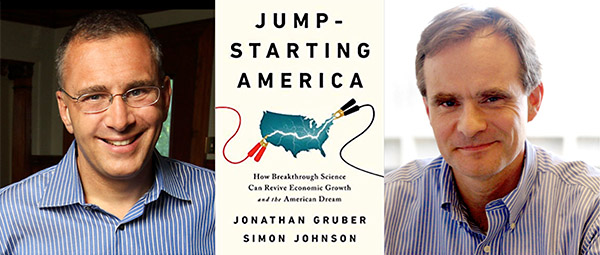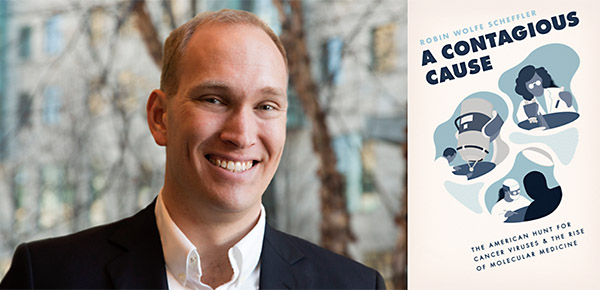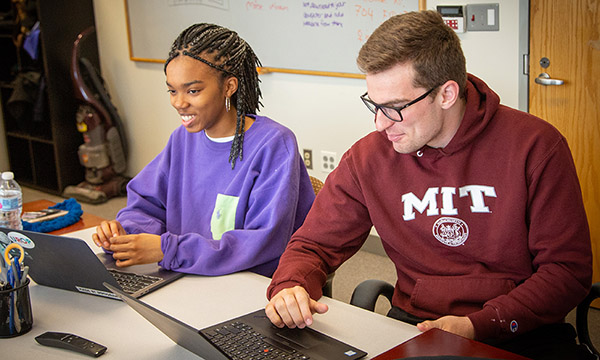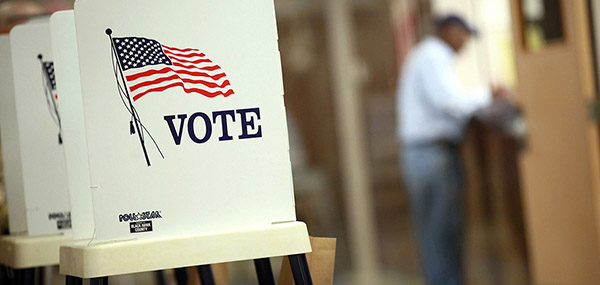Said and Done
April 2019
MIT School of Humanities, Arts, and Social Sciences
QUOTABLE
"The innovation that led to rapid growth after World War II was the direct result of a fruitful partnership between the private sector, federal government, and universities that allowed us to benefit as a country."
— MIT economists Jonathan Gruber and Simon Johnson
RESEARCH
CENTER FOR INTERNATIONAL STUDIES
Climate expert emphasizes the fierce urgency of now
In an MIT talk, Lord Nicholas Stern called the next 20 years “absolutely defining” for human society. A world with a net of zero carbon dioxide emissions within a few decades will be absolutely necessary for society to maintain its current form, he said: "If you want to stabilize temperatures, you’re going to have to stabilize concentrations. Stabilizing concentrations means net zero.”
Story by Peter Dizikes at MIT News
ECONOMICS
A bold plan to jump-start America | Jonathan Gruber and Simon Johnson
In this new book, MIT economists Gruber and Johnson recommend private/public partnerships that invest heavily in science funding, which can spur spin-off industries and job growth that reach all regions of the country, reduce the country's growing economic inequality, and sustain American leadership.
Story at MIT News | WGBH Story | Commentary in The Boston Globe | Gruber on WGBH

L: Jon Gruber; photo by Bill Greene/The Boston Globe; R: Simon Johnson, photo via MIT News
One of the most important lessons of the innovative post-1945 period in the US is that research and development drive productivity, better jobs, and higher incomes. And "government support for science," say Gruber and Johnson, "can create an economic tide that lifts all boats.”
ECONOMICS
The problem with automation | Daron Acemoglu and Pascual Restrepo
Several studies have pushed back against concern over accelerated automation, predicting that robots will produce more jobs than they destroy. But in three new papers, two leading economists—MIT's Daron Acemoglu and Boston University's Pascual Restrepo—say that is not how automation has played out over the last 30 years—nor will it in the future if left to its own devices.
Story at Axios | Paper 1 | Paper 2 | Paper 3
ETHICS, COMPUTING, AND AI
Series: Ethics, Computing, and AI | Perspectives from MIT
Will the future be humane, just, and livable? Twenty MIT faculty offer practical, inspiring, and clear-eyed views in this series.
Browse the Series | Online Booklet: highlights from the series
POLITICAL SCIENCE
Even very short jail sentences drive people away from voting | Ariel White
New research by MIT political scientist Ariel White shows that even a misdemeanor charge leading to a few days in jail can lead to a significant decrease in future voting; the effect disproportionately pushes black voters out of the electorate.
Commentary in The Washington Post | Research summary
SCIENCE, TECHNOLOGY, AND SOCIETY
Why are student-athletes amateurs? | Jennifer Light
"Today's controversies around student-athletes and teaching assistants stem in part from the century-old assumption that students by definition are cultivating their human capital and defering economic participation until they graduate to the 'real world.' That’s always been a fantasy."
Interview with Jennifer Light
POLITICAL SCIENCE
Commerce and coercion | Kacie Miura
Research by doctoral candidate Miura shows that when responding to disputes with foreign powers, China does not speak with one voice.
Story
SCIENCE, TECHNOLOGY, AND SOCIETY
The American hunt for cancer viruses | Robin Wolfe Scheffler
A Contagious Cause is the first book to trace the century-long hunt for a human cancer virus in America, an effort whose scale exceeded that of the Human Genome Project. Scheffler links laboratory and legislation as has rarely been done before, creating a new chapter in the histories of science and American politics.
University of Chicago Press | Robin Wolfe Sheffler
HISTORY AND COMPUTATION
Digital Zombies and Virtual Reality | Juliette Levy on the digital history classroom
For a new series sponsored by MIT History, Levy describes how digital and computational tools enhance learning in her history classroom.
Story by SHASS Communications
CENTER FOR INTERNATIONAL STUDIES
After the Cold War, an uncertain peace | Michael McFaul
In an MIT talk, Michael McFaul, former U.S. ambassador to Russia, explores tensions between the two countries.
Story + Video
FEATURE | THE SCIENCE OF LANGUAGE
How is it possible that simple acoustic vibrations, hand gestures, and even ink patterns can give one person access to the thoughts of someone else? This is the central question of linguistics.

Learn why young children and their parents interpret the sentence "You can have cake or ice cream" quite differently.
Properties of the human mind | Three questions with David Pesetsky
For decades, MIT Linguistics been considered the best linguistics program in the world. We spoke recently with David Pesetsky, Ferrari P. Ward Professor of Modern Languages and Linguistics at MIT, who discussed how the science of language sheds light on deep properties of the human mind.
Interview by SHASS Communications
Companion piece | The building blocks of linguistics
A brisk overview of the field of linguistics: Make your own personal dialect map; Learn why young children and their parents interpret the sentence "You can have cake or ice cream" quite differently; Discover the top ten ways that linguists contribute to making a better world.
Have fun with this
STUDENTS AND ALUMNI

L to R: Ifeoluwapo Ademolu-Odeneye and Keith Murray; Photo by Jon Sachs / MIT SHASS Communications
DIGITAL HUMANITIES
MIT Programs in Digital Humanities launches with $1.3M Mellon grant
The "DH Lab" applies computational tools to humanistic research — and builds a community fluent in both languages. A report from the lab's inaugural big data project, "Gender/Novels," is now live.
Story about the Lab | Companion piece in Ms. Magazine on the "Gender/Novels" project
SCIENCE WRITING
Kendra Pierre-Louis, SM'16, on being a climate reporter for The New York Times
The City Club of Boise recently welcomed Pierre-Louis to discuss reporting on the science and social impacts of climate change for the NYT's climate desk. Kendra is also the author of Green Washed: Why We Can’t Buy Our Way to a Green Planet.
Podcast | Kendra Pierre-Louis SM'16
HASTS DOCTORAL PROGRAM
The future of computing education | Marc Aidinoff
MIT SHASS PhD candidate Marc Aidinoff talked with WGBH about the new MIT Schwarzman College of Computing — what it means for MIT and what it signals for higher education. His insightful interview begins at 34:48.
WGBH: Commentary begins at 34:48 | Marc Aidinoff webpage
CENTER FOR INTERNATIONAL STUDIES
Online course in public policy for scientists and engineers | Starts April 16
Are you a scientist or engineer seeking to engage with policymakers? Great — the policy world needs your insight! This new 3-week, self-paced MITx course from the MIT SHASS-based Policy Lab provides an introduction to the policymaking process and practical tips for engaging with the policy community.
About the course: Tools for Academic Engagement in Public Policy
STEM + HUMANITIES + ECONOMICS
Meet the bilinguals | Katie O'Nell and Divya Goel
O’Nell, an MIT Brain and Cognitive Studes major, credits her MIT humanities classes for "doing the most" to shape her as a scientist, enabling her to "examine the lenses through which I view the world a lot more closely.” Goel, an MIT EECS and MIT Economics major, says that when technologists and humanists collaborate — from the start of a project — their interdisciplinary work can lead to better, more accurate results.
Story at MIT News
THEATER + MUSIC + CHEMISTRY
The chemist and the stage | Audrey Pillsbury
Senior chemistry major and artist Audrey Pillsbury creates a musical about life as a second-generation Asian-American.
Story at MIT News | 2-minute video
MUSIC + INTERNATIONAL EDUCATION
MIT Festival Jazz Ensemble in Puerto Rico | Fred Harris, Jr., Director
25 student-musicians in the acclaimed FJE and saxophone giant Miguel Zenón, a native of Puerto Rico, recently visited his native island for a series of music concerts, cultural workshops, and classroom presentations.
Story by MTA | Zenón's "En Pie De Lucha," a tribute to the people of Puerto Rico
STAY IN TOUCH
Follow us
![]()
![]()
Subscribe to Said and Done
10 issues a year
In the Media
Recent coverage
Research Impact
Explore
SHASS on MIT News
Research and Features
MIT Campaign for a Better World
Story | Join Us
Videos
Watch

Published by SHASS Communications
Office of the Dean, MIT School of Humanities, Arts, and Social Sciences
Editor and Designer: Emily Hiestand
Publication Associate: Alison Lanier
Published 16 April 2019

